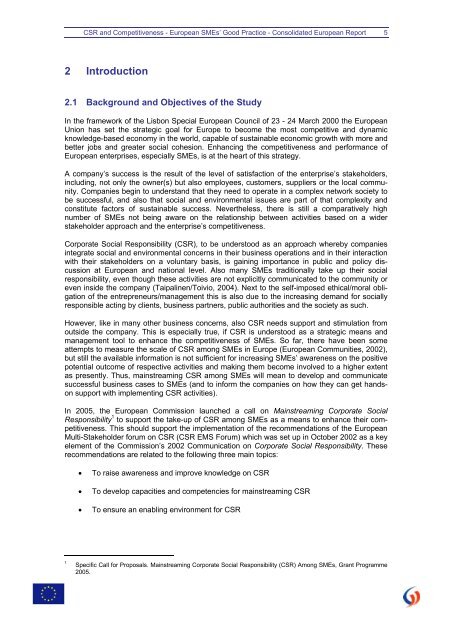CSR and Competitiveness European SMEs - KMU Forschung Austria
CSR and Competitiveness European SMEs - KMU Forschung Austria
CSR and Competitiveness European SMEs - KMU Forschung Austria
You also want an ePaper? Increase the reach of your titles
YUMPU automatically turns print PDFs into web optimized ePapers that Google loves.
<strong>CSR</strong> <strong>and</strong> <strong>Competitiveness</strong> - <strong>European</strong> <strong>SMEs</strong>’ Good Practice - Consolidated <strong>European</strong> Report 5<br />
2 Introduction<br />
2.1 Background <strong>and</strong> Objectives of the Study<br />
In the framework of the Lisbon Special <strong>European</strong> Council of 23 - 24 March 2000 the <strong>European</strong><br />
Union has set the strategic goal for Europe to become the most competitive <strong>and</strong> dynamic<br />
knowledge-based economy in the world, capable of sustainable economic growth with more <strong>and</strong><br />
better jobs <strong>and</strong> greater social cohesion. Enhancing the competitiveness <strong>and</strong> performance of<br />
<strong>European</strong> enterprises, especially <strong>SMEs</strong>, is at the heart of this strategy.<br />
A company’s success is the result of the level of satisfaction of the enterprise’s stakeholders,<br />
including, not only the owner(s) but also employees, customers, suppliers or the local community.<br />
Companies begin to underst<strong>and</strong> that they need to operate in a complex network society to<br />
be successful, <strong>and</strong> also that social <strong>and</strong> environmental issues are part of that complexity <strong>and</strong><br />
constitute factors of sustainable success. Nevertheless, there is still a comparatively high<br />
number of <strong>SMEs</strong> not being aware on the relationship between activities based on a wider<br />
stakeholder approach <strong>and</strong> the enterprise’s competitiveness.<br />
Corporate Social Responsibility (<strong>CSR</strong>), to be understood as an approach whereby companies<br />
integrate social <strong>and</strong> environmental concerns in their business operations <strong>and</strong> in their interaction<br />
with their stakeholders on a voluntary basis, is gaining importance in public <strong>and</strong> policy discussion<br />
at <strong>European</strong> <strong>and</strong> national level. Also many <strong>SMEs</strong> traditionally take up their social<br />
responsibility, even though these activities are not explicitly communicated to the community or<br />
even inside the company (Taipalinen/Toivio, 2004). Next to the self-imposed ethical/moral obligation<br />
of the entrepreneurs/management this is also due to the increasing dem<strong>and</strong> for socially<br />
responsible acting by clients, business partners, public authorities <strong>and</strong> the society as such.<br />
However, like in many other business concerns, also <strong>CSR</strong> needs support <strong>and</strong> stimulation from<br />
outside the company. This is especially true, if <strong>CSR</strong> is understood as a strategic means <strong>and</strong><br />
management tool to enhance the competitiveness of <strong>SMEs</strong>. So far, there have been some<br />
attempts to measure the scale of <strong>CSR</strong> among <strong>SMEs</strong> in Europe (<strong>European</strong> Communities, 2002),<br />
but still the available information is not sufficient for increasing <strong>SMEs</strong>’ awareness on the positive<br />
potential outcome of respective activities <strong>and</strong> making them become involved to a higher extent<br />
as presently. Thus, mainstreaming <strong>CSR</strong> among <strong>SMEs</strong> will mean to develop <strong>and</strong> communicate<br />
successful business cases to <strong>SMEs</strong> (<strong>and</strong> to inform the companies on how they can get h<strong>and</strong>son<br />
support with implementing <strong>CSR</strong> activities).<br />
In 2005, the <strong>European</strong> Commission launched a call on Mainstreaming Corporate Social<br />
Responsibility 1 to support the take-up of <strong>CSR</strong> among <strong>SMEs</strong> as a means to enhance their competitiveness.<br />
This should support the implementation of the recommendations of the <strong>European</strong><br />
Multi-Stakeholder forum on <strong>CSR</strong> (<strong>CSR</strong> EMS Forum) which was set up in October 2002 as a key<br />
element of the Commission’s 2002 Communication on Corporate Social Responsibility. These<br />
recommendations are related to the following three main topics:<br />
• To raise awareness <strong>and</strong> improve knowledge on <strong>CSR</strong><br />
• To develop capacities <strong>and</strong> competencies for mainstreaming <strong>CSR</strong><br />
• To ensure an enabling environment for <strong>CSR</strong><br />
1<br />
Specific Call for Proposals. Mainstreaming Corporate Social Responsibility (<strong>CSR</strong>) Among <strong>SMEs</strong>, Grant Programme<br />
2005.




